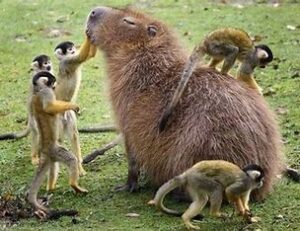FUN FACTS ABOUT CAPYBARAS
Here you can discover some fun facts about capybaras. Capybaras are amazing animals that can do many things that humans and dogs can do. They are smarter than most people think, and they have their own way of living and learning. Capybaras can learn new things, communicate with each other, and solve problems. They can even use tools to help them survive in their natural habitat.
 Capybaras love water. They live near places where there is water, like rivers and lakes. They like to swim and can stay underwater for a long time. They have webbed feet to help them swim. They also have eyes, ears, and nose on top of their heads so they can see and breathe when they are in the water.
Capybaras love water. They live near places where there is water, like rivers and lakes. They like to swim and can stay underwater for a long time. They have webbed feet to help them swim. They also have eyes, ears, and nose on top of their heads so they can see and breathe when they are in the water.
Capybaras eat plants, like grass and water plants. They also eat fruits and tree bark. They have a special stomach that helps them break down the plants. They also eat their own poop to get more good stuff from their food.
 Baby capybaras are called pups and look like miniature versions of their parents. Imagine a tiny, fluffy capybara exploring the world! Pups are born fully developed. As soon as they arrive, they’re ready to swim and run! Imagine a little capybara splashing around in a pond—it’s adorable Capybara moms are super protective. They’ll fiercely defend their pups against any danger.
Baby capybaras are called pups and look like miniature versions of their parents. Imagine a tiny, fluffy capybara exploring the world! Pups are born fully developed. As soon as they arrive, they’re ready to swim and run! Imagine a little capybara splashing around in a pond—it’s adorable Capybara moms are super protective. They’ll fiercely defend their pups against any danger.
Although capybaras are very friendly, they have some enemies, like jaguars, snakes, and crocodiles. They use their teeth and claws to fight back, but they also run and swim fast to get away. They can run fast – around 22 miles per hour!
 Capybaras are very nice and playful animals. Capybaras are easy-going with other animals. They can be shy at first, especially if the other animals are bigger than they are. These gentle giants enjoy napping by the water’s edge, and you’ll often find them snuggled up beside turtles, birds, ducks, rats, and even monkeys. Capybaras are excellent hosts—they let birds and monkeys hop on their backs for a ride while they search for grasses and plants to eat. Sometimes, they even serve as cruise guides, allowing other animals to sit atop their heads as they swim through the water!
Capybaras are very nice and playful animals. Capybaras are easy-going with other animals. They can be shy at first, especially if the other animals are bigger than they are. These gentle giants enjoy napping by the water’s edge, and you’ll often find them snuggled up beside turtles, birds, ducks, rats, and even monkeys. Capybaras are excellent hosts—they let birds and monkeys hop on their backs for a ride while they search for grasses and plants to eat. Sometimes, they even serve as cruise guides, allowing other animals to sit atop their heads as they swim through the water!
Capybaras can live for up to 4 years in the wild1, but they can live longer in a safe place. Some say that they can live for 8 to 10 years in the wild, and up to 15 years or more in a safe place.
